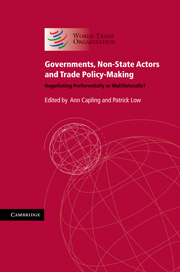Book contents
- Frontmatter
- Contents
- List of figures and tables
- List of contributors
- Acknowledgements
- Disclaimer
- Introduction
- 1 The domestic politics of trade policy-making: state and non-state actor interactions and forum choice
- 2 Chile
- 3 Colombia
- 4 Mexico
- 5 Indonesia
- 6 Thailand
- 7 Jordan
- 8 Kenya
- 9 South Africa
- 10 The influence of international non-state actors in multilateral and preferential trade agreements: a question of forum shopping?
- 11 Main findings and conclusions
- Index
- References
10 - The influence of international non-state actors in multilateral and preferential trade agreements: a question of forum shopping?
Published online by Cambridge University Press: 05 July 2014
- Frontmatter
- Contents
- List of figures and tables
- List of contributors
- Acknowledgements
- Disclaimer
- Introduction
- 1 The domestic politics of trade policy-making: state and non-state actor interactions and forum choice
- 2 Chile
- 3 Colombia
- 4 Mexico
- 5 Indonesia
- 6 Thailand
- 7 Jordan
- 8 Kenya
- 9 South Africa
- 10 The influence of international non-state actors in multilateral and preferential trade agreements: a question of forum shopping?
- 11 Main findings and conclusions
- Index
- References
Summary
Introduction
This chapter examines the influence that non-state actors (NSAs) seek to exert on trade policy formulation at the WTO multilateral level and at the national governmental level. The analysis focuses on international NSAs that have a substantial presence in Geneva, either because they are based there or because they seek to engage on a regularized basis with the WTO. The main objectives of this chapter are to explore how these NSAs seek to influence trade policy development, both at the WTO and the national level, especially in relation to the question of forum choice: that is, the relative benefits of negotiating multilaterally or preferentially. It also investigates whether those NSAs involved in trade policy-making consider the WTO versus PTAs as a form of ‘forum-shopping’ to pursue their particular agendas, interests and objectives.
The analysis focuses on three main categories of NSAs: namely, business organizations, trade unions, and civil society organizations (CSOs). Research for this chapter has been largely gathered through surveys and was complemented, in some cases, with structured interviews with a number of Geneva-based NSA representatives.
The structure of the chapter is as follows. Section 2 describes how NSAs seek to influence trade policy formulation at both the multilateral and national governmental level. It also examines how NSAs seek to exert influence from the perspective of their aims and interests. Section 3 looks at the influence that NSAs aim to exert on trade policy formulation at the multilateral and national governmental level in relation to the negotiation of PTAs, and tries to determine whether this can be considered a form of ‘forum shopping’. Section 4 puts forth the study’s main findings and conclusions.
- Type
- Chapter
- Information
- Governments, Non-State Actors and Trade Policy-MakingNegotiating Preferentially or Multilaterally?, pp. 284 - 310Publisher: Cambridge University PressPrint publication year: 2010
References
- 1
- Cited by



